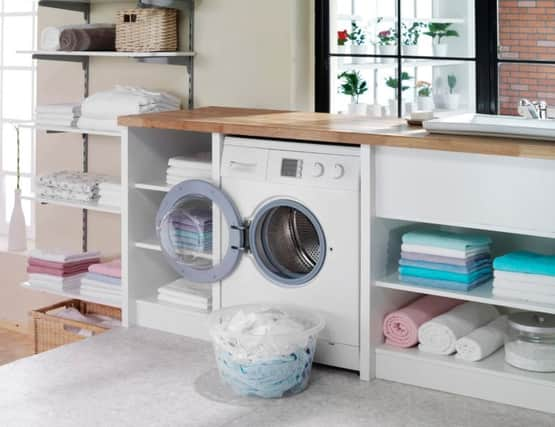Deadly infection risk from dirty washing machines


Research shows 44 per cent of the nation’s laundry machines are laden with the E coli bug which can cause serious health complications including kidney failure.
Expert advice warns the bacteria and others like Staphylococcus aureus and Pseudomonas aeruginosa are present in the many people’s laundry.
Advertisement
Hide AdAdvertisement
Hide AdKim Woodburn from How Clean Is Your House? says this is down to people not cleaning their washers.
She added: “The problem is that people do not clean their appliances at the right temperatures.
“To save money many people will consistently wash at 30 or 40 degrees but by doing this all the time runs the risk of bacteria building up.
“Depending on how often you use your washing machine you need to occasionally wash it on as much as 90, because 30 is inadequate, it will not clean it out.”
Advertisement
Hide AdAdvertisement
Hide AdApplicance repair firm GlotechRepairs.co.uk quizzed 2,000 Brits about how often they clean their domestic gadgets such as washing machines.
However, less than 20 per cent of those surveyed said they follow the recommended once a month washing machine clean.
More than half the of respondents said they clean their machine every few months or less.
Kim added: “If you have a large family and do a lot of washing you should clean your machine at least, at least twice a month.
Advertisement
Hide AdAdvertisement
Hide Ad“You also need to consider what goes in with each wash, a workman’s clothes will be full of germs and gunge.
“To make sure no bacteria gets lodged people should clean those at higher temperatures and clean regularly after these washes.”
The 74-year-old also warned against overloading the machine because this stops the cleaning process from working on all the clothes and the inside of the device.
She recommends a third full machine to ensure the clothes can beat around the drum.
Advertisement
Hide AdAdvertisement
Hide AdAccording to the study younger people are least likely to clean their appliances as 30 per cent of 18-24s and over 20 per cent of 25-34s admitted to never undergoing the clean.
The older people surveyed were more likely to regularly clean their appliances, however over 10 per cent of the people aged 55 and over still admitted to never cleaning their washing machine.
There are more than 20,000 reports of E. coli infection in the UK each year and the people most affected are the elderly.
Kim said: “I know people are trying to be economical by washing at lower temperatures but they should be economical in other ways, there is nothing worse than a germ-infested smelly washing machine.”
Advertisement
Hide AdAdvertisement
Hide AdShe said people should be aware that clothes can look clean but still carry bacteria which can pose a health risk, especially to the elderly and young children who have weak immune systems.
People in West Midlands are most likely to clean machine, whereas the South West have the dirtiest machines as 22 per cent admit to never cleaning.
The survey also asked about other appliances and found that almost 10 per cent of dishwasher owners never clean the appliance and 20 per cent of respondents never clean their kettle and the average person cleans their fridge every few months.
The cleanest appliance was the microwave as 31 per cent of those surveyed claimed to clean their machine once a week while only 1 per cent never clean it.
Advertisement
Hide AdAdvertisement
Hide AdMark Reeves from Glotech Repairs said: “It’s shocking to see so many people are neglecting the proper upkeep their appliances require.
“Especially considering how easy it is to keep your washing machine clean.
“The smell inside the washing machine is worst if people do nearly all their washes at low temperature with a liquid detergent.
“They can reduce this by washing at higher temperatures and using powder, preferably a boil wash once a month.
“Detergent for whites also should reduce bacteria as it contains a bleach. Putting Bleach in the wash definitely kills the bacteria but could be a hazard.”